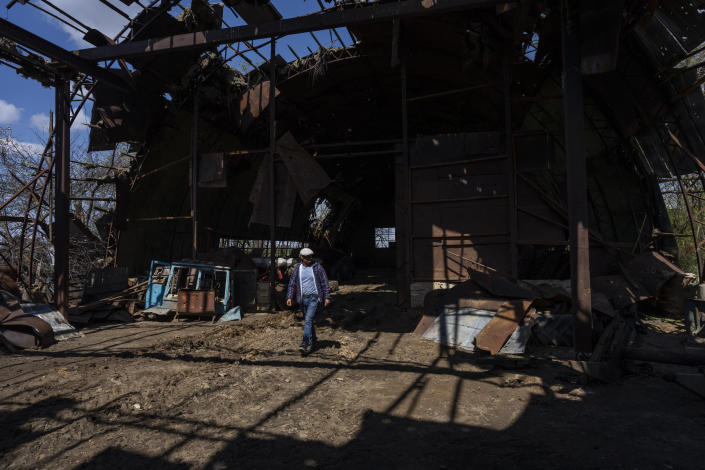Ukraine farmers surrounded by risks, from mines to logistics

Views (195)

Workers like Victor Kostiuk still spot mines, but he's ready to start the tractor. Across Ukraine, the war has forced grain growers into a vicious dilemma. Farmers in areas now free from Russian occupation must decide if it's worth risking their lives to strip land of explosives before the critical spring planting season.
Workers like Victor Kostiuk still spot mines, but he's ready to start the tractor.
“We have to do it,” he says, “Why be afraid?”
The FAO says 90% of agricultural businesses lost revenue and 12% reported lands contaminated with mines. Land planted with grain dropped last year to 11.6 million hectares (28.6 million acres) from 16 million hectares (around 40 million acres) in 2021. That's expected to fall to 10.2 million hectares (25.2 million acres) this year.
But growers can’t wait: April and May are key planting months for corn, the autumn months for wheat. Many are switching to planting oil seeds that are less costly.
Zaiets is one, and Valerii Shkuropat from the nearby village of Ivanivka is the other.
“Our heroes,” said Shostak-Kuchmiak, “who were driving their cars around picking up mines and bringing them to our deminers.”
Last month, one of his workers was killed and another was wounded while picking up metal missile remnants.
“If we sow, if we grow crops, people will have jobs, salaries and they will have a means to feed their families,” Shkuropat said. “But if we don’t do anything, we will have nothing.”
Farmers are responding by seeding less, said Andrii Vadaturskyi, CEO of Nibulon, a top Ukrainian grain shipping company.
“No one is paying attention to the fact that already 40% less wheat has been seeded (this year), and we expect 50% less corn will be seeded in Ukraine,” he said, drawing on data from 3,000 farmers.
HarvEast CEO Dmytro Skornyakov said that his agricultural company pays almost $110 in logistics costs to export every ton of corn.
“It covers our expenses, but doesn’t give us any profit,” he said.
“We had some vessels which were waiting close to 80 days in the queue simply to be loaded,” said Vadaturskyi of Nibulon. “Someone has to lose that money, either the buyer, owner of the vessel or trader.”
Meanwhile, some farmers won't risk planting their fields.
Oleh Uskhalo’s land in Potiomkyne is awash with ammunition, the vast wheat farms reduced to a graveyard of scorched equipment.
“We can go on for another year,” he said. After that, he doesn’t know. He hopes for government compensation.
“I cannot send (my workers) to a field where I know mines and bombs are,” Uskhalo said. “To send a person to blow themselves up? I can’t do that.”
“The tractor drivers, they say, ‘We can go, we can sign a document stating that we take full responsibility,’” Uskhalo said.
It’s too risky, he told them.
In the distance, he can see a tractor equipped with disk tillers, a type of plow. “I wonder if it’s Volodymyr Mykolaiovych,” he said, referring to Zaiets.
“All it takes is for one of those disks to hit a mine and that’s it.”
That’s what happened to Mykola Ozarianskyi.
In April, the farmer took a chance: He hopped on his tractor in his village of Borozenske, in Kherson, to head to a friend’s sunflower field to cut stalks.
He swerved to turn down a side farm road. He remembers the explosion, then waking up in a hospital bed with a collapsed lung and broken ribs.
Every day, he thinks of his 16 hectares (around 40 acres) of land, still unseeded.
“I will do it,” he said, straining to speak while a tube drains blood from his chest. “For a farmer, not planting means death.”
___
0 Likes
